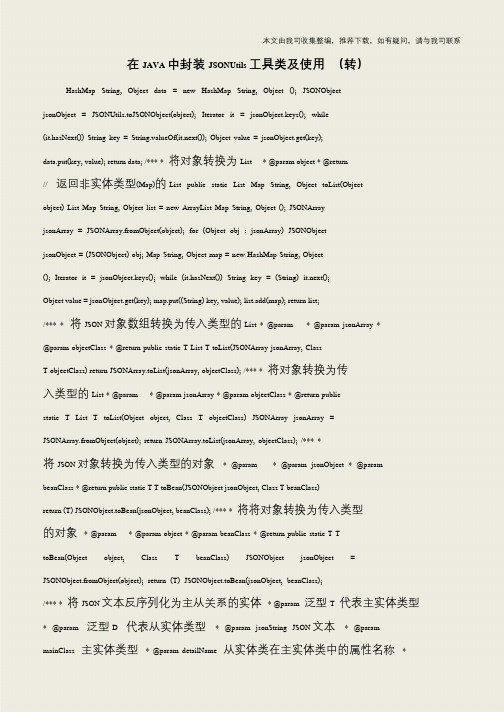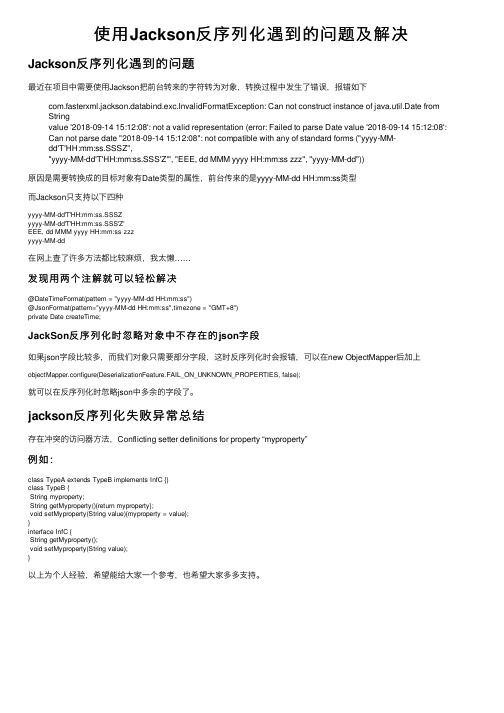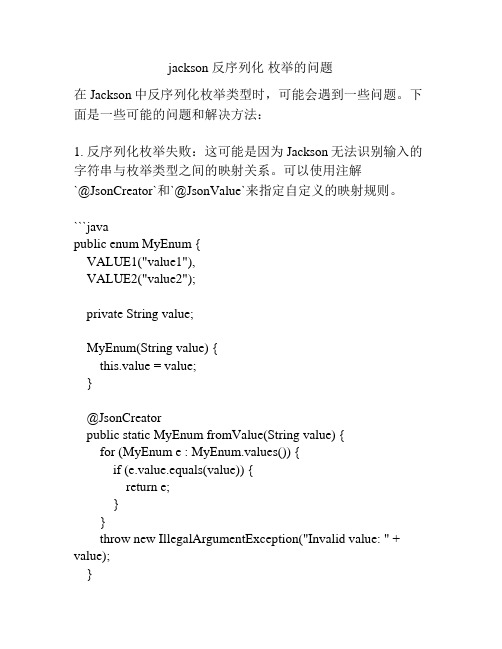【IT专家】反序列化无效的类
【IT专家】在JAVA中封装JSONUtils工具类及使用 (转)

本文由我司收集整编,推荐下载,如有疑问,请与我司联系在JAVA 中封装JSONUtils 工具类及使用(转)HashMap String, Object data = new HashMap String, Object (); JSONObject jsonObject = JSONUtils.toJSONObject(object); Iterator it = jsonObject.keys(); while (it.hasNext()) String key = String.valueOf(it.next()); Object value = jsonObject.get(key); data.put(key, value); return data; /*** * 将对象转换为List * @param object * @return// 返回非实体类型(Map)的List public static List Map String, Object toList(Object object) List Map String, Object list = new ArrayList Map String, Object (); JSONArray jsonArray = JSONArray.fromObject(object); for (Object obj : jsonArray) JSONObject jsonObject = (JSONObject) obj; Map String, Object map = new HashMap String, Object (); Iterator it = jsonObject.keys(); while (it.hasNext()) String key = (String) it.next(); Object value = jsonObject.get(key); map.put((String) key, value); list.add(map); return list; /*** * 将JSON 对象数组转换为传入类型的List * @param * @param jsonArray *@param objectClass * @return public static T List T toList(JSONArray jsonArray, Class T objectClass) return JSONArray.toList(jsonArray, objectClass); /*** * 将对象转换为传入类型的List * @param * @param jsonArray * @param objectClass * @return public static T List T toList(Object object, Class T objectClass) JSONArray jsonArray = JSONArray.fromObject(object); return JSONArray.toList(jsonArray, objectClass); /*** *将JSON 对象转换为传入类型的对象* @param * @param jsonObject * @param beanClass * @return public static T T toBean(JSONObject jsonObject, Class T beanClass)return (T) JSONObject.toBean(jsonObject, beanClass); /*** * 将将对象转换为传入类型的对象* @param * @param object * @param beanClass * @return public static T T toBean(Object object, Class T beanClass) JSONObject jsonObject = JSONObject.fromObject(object); return (T) JSONObject.toBean(jsonObject, beanClass); /*** * 将JSON 文本反序列化为主从关系的实体* @param 泛型T 代表主实体类型* @param 泛型D 代表从实体类型* @param jsonString JSON 文本* @param mainClass 主实体类型* @param detailName 从实体类在主实体类中的属性名称*。
使用Jackson反序列化遇到的问题及解决

使⽤Jackson反序列化遇到的问题及解决Jackson反序列化遇到的问题最近在项⽬中需要使⽤Jackson把前台转来的字符转为对象,转换过程中发⽣了错误,报错如下c om.fasterxml.jackson.databind.exc.InvalidFormatException: Can not construct instance of java.util.Date fromStringvalue '2018-09-14 15:12:08': not a valid representation (error: Failed to parse Date value '2018-09-14 15:12:08': Can not parse date "2018-09-14 15:12:08": not compatible with any of standard forms ("yyyy-MM-dd'T'HH:mm:ss.SSSZ","yyyy-MM-dd'T'HH:mm:ss.SSS'Z'", "EEE, dd MMM yyyy HH:mm:ss zzz", "yyyy-MM-dd"))原因是需要转换成的⽬标对象有Date类型的属性,前台传来的是yyyy-MM-dd HH:mm:ss类型⽽Jackson只⽀持以下四种yyyy-MM-dd'T'HH:mm:ss.SSSZyyyy-MM-dd'T'HH:mm:ss.SSS'Z'EEE, dd MMM yyyy HH:mm:ss zzzyyyy-MM-dd在⽹上查了许多⽅法都⽐较⿇烦,我太懒……发现⽤两个注解就可以轻松解决@DateTimeFormat(pattern = "yyyy-MM-dd HH:mm:ss")@JsonFormat(pattern="yyyy-MM-dd HH:mm:ss",timezone = "GMT+8")private Date createTime;JackSon反序列化时忽略对象中不存在的json字段如果json字段⽐较多,⽽我们对象只需要部分字段,这时反序列化时会报错,可以在new ObjectMapper后加上objectMapper.configure(DeserializationFeature.FAIL_ON_UNKNOWN_PROPERTIES, false);就可以在反序列化时忽略json中多余的字段了。
关于序列化的异常处理

序列化是以字节流的形式将数据保存到磁盘和从磁盘上将数据读到内存中的过程。
一、标准MFC框架程序的文件保存和读取函数:1.打开文件,参见\Microsoft Visual Studio\VC98\MFC\SRC\DOCCORE.CPP:BOOL CDocument::OnOpenDocument(LPCTSTR lpszPathName)2.保存文件,参见\Microsoft Visual Studio\VC98\MFC\SRC\DOCCORE.CPP:BOOL CDocument::OnSaveDocument(LPCTSTR lpszPathName)这两个函数实现过程类似,都是先得到一个文件指针,然后声明一个CArchive对象,之后调用Serialize函数实现序列化数据输入或输出,出于Serialize是一个虚函数,因此实际上调用的是用户程序中文档类的序列化函数。
在CDocument类中调用Serialize 函数时使用try和catch对异常情况进行处理,比如在读取文件时越界将给出提示。
二、在自己的应用程序的序列化中使用异常处理1.序列化异常类:CArchiveException,派生于CException类。
CArchiveException包含一个int类型的m_cause成员,它为以下枚举值之一:a) CArchiveException::none无错b) CArchiveException::generic一个无法识别的错误c) CArchiveException::readOnly试图写以读入方式打开的文件d) CArchiveException::endOfFile已到文件尾e) CArchiveException::writeOnly试图读以存储方式打开的文件f) CArchiveException::badIndex无效文件格式g) CArchiveException::badClass把一个对象读到错误对象类型中去h) CArchiveException::badSchema版本号错误2.抛出异常函数:void AfxThrowArchiveException(int cause,LPCTSTR lpszArchiveName = NULL);在有序列化异常发生时可使用AfxThrowArchiveException抛出异常,参数cause为异常的原因,为上面的枚举值之一,参数lpszArchiveName为档案文件名。
Jackson反序列化@JsonFormat不生效的解决方案

Jackson反序列化@JsonFormat不⽣效的解决⽅案今天在线上发现⼀个问题,在使⽤Jackson进⾏时间的反序列化时,配置的@JsonFormat没有⽣效查看源码发现,Jackson在反序列化时间时,会判断json字段值类型,如下:由于在我们服务⾥,前端传时间值到后端时采⽤了时间戳的⽅式,json值被判断为数字类型,所以Jackson在反序列化时直接简单粗暴的⽅式处理,将时间戳转换为Date类型:为了能够按照正确的格式解析时间,抹去后⾯的时间点,精确到⽇,只好⾃定义⼀个时间解析器。
⾃定义的时间解析器很好实现,⽹上已经有很多实例代码,只需要继承 JsonDeserializer<T> 就可以。
问题的关键点在于,如何获取到注解上的时间格式,按照注解上的格式去解析,否则每个解析器的实现只能使⽤⼀种固定的格式去解析时间。
1. 所以第⼀步是获取注解上配置的信息想要获取字段对应的注解信息,只有找到相应的字段,然后通过字段属性获取注解信息,再通过注解信息获取配置的格式。
但找了很久,也没有在既有的参数⾥找到获取相关字段的⽅法,只能去翻看源码,最后在这⾥发现了获取字段信息的⽅法以及解析器的⽣成过程,源代码如下:第⼀个红框表⽰解析器是在这⾥⽣成的,第⼆个红框就是获取注解信息的地⽅2. 注解获取以后便创建⾃定义的时间解析器猜想,我们可不可以也实现这个类,重写⽣成解析器的⽅法?那就试试呗~我们在⾃定义的时间解析器上同样实现这个类,重写了⽣成时间解析器的⽅法,并初始化⼀些⾃定义的信息供解析时间使⽤(当然猜想是正确的,因为官⽅就是这么搞的,只是官⽅的是⼀个内部类实现的),具体代码如下:时间解析器代码:import com.fasterxml.jackson.annotation.JsonFormat;import com.fasterxml.jackson.core.JsonParser;import com.fasterxml.jackson.databind.BeanProperty;import com.fasterxml.jackson.databind.DeserializationContext;import com.fasterxml.jackson.databind.JsonDeserializer;import com.fasterxml.jackson.databind.deser.ContextualDeserializer;import com.fasterxml.jackson.databind.util.StdDateFormat;import mon.collect.Lists;import ErrorCode;import Exception;import java.io.IOException;import java.text.DateFormat;import java.text.ParseException;import java.text.SimpleDateFormat;import java.util.Date;import java.util.List;import java.util.Locale;import java.util.TimeZone;import ng.StringUtils;import ng3.time.DateUtils;import org.slf4j.Logger;import org.slf4j.LoggerFactory;/*** @author ⽆名⼩⽣ Date: 2019-02-19 Time: 19:00* @version $Id$*/public class DateJsonDeserializer extends JsonDeserializer<Date> implements ContextualDeserializer {private final static Logger logger = LoggerFactory.getLogger(DateJsonDeserializer.class);private final static List<String> FORMATS = Lists.newArrayList("yyyy-MM-dd HH:mm:ss", "yyyy-MM-dd HH:mm", "yyyyMMdd-HHmmss", "yyyy-MM-dd", "MM-dd", "HH:mm:ss", "yyyy-MM");public final DateFormat df;public final String formatString;public DateJsonDeserializer() {this.df = null;this.formatString = null;this.df = df;this.formatString = "";}public DateJsonDeserializer(DateFormat df, String formatString) {this.df = df;this.formatString = formatString;}@Overridepublic Date deserialize(JsonParser p, DeserializationContext ctxt) throws IOException {try {String dateValue = p.getText();if (df == null || StringUtils.isEmpty(dateValue)) {return null;}("使⽤⾃定义解析器解析字段:{}:时间:{}",p.getCurrentName(),p.getText());Date date;if (StringUtils.isNumeric(dateValue)){date = new Date(Long.valueOf(dateValue));}else {String[] patterns = FORMATS.toArray(new String[0]);date = DateUtils.parseDate(p.getText(),patterns);}return df.parse(df.format(date));} catch (ParseException | SecurityException e) {logger.error("JSON反序列化,时间解析失败", e);throw new BizException(BizErrorCode.UNEXPECTED_ERROR);}}@Overridepublic JsonDeserializer<?> createContextual(DeserializationContext ctxt, BeanProperty property) {if (property != null) {JsonFormat.Value format = ctxt.getAnnotationIntrospector().findFormat(property.getMember());if (format != null) {TimeZone tz = format.getTimeZone();// First: fully custom pattern?if (format.hasPattern()) {final String pattern = format.getPattern();if (!FORMATS.contains(pattern)){FORMATS.add(pattern);}final Locale loc = format.hasLocale() ? format.getLocale() : ctxt.getLocale();SimpleDateFormat df = new SimpleDateFormat(pattern, loc);if (tz == null) {tz = ctxt.getTimeZone();}df.setTimeZone(tz);return new DateJsonDeserializer(df, pattern);}// But if not, can still override timezoneif (tz != null) {DateFormat df = ctxt.getConfig().getDateFormat();// one shortcut: with our custom format, can simplify handling a bitif (df.getClass() == StdDateFormat.class) {final Locale loc = format.hasLocale() ? format.getLocale() : ctxt.getLocale();StdDateFormat std = (StdDateFormat) df;std = std.withTimeZone(tz);std = std.withLocale(loc);df = std;} else {// otherwise need to clone, re-set timezone:df = (DateFormat) df.clone();df.setTimeZone(tz);}return new DateJsonDeserializer(df);}}}return this;}}⾄此,⾃定义时间解析器就完成了但是,为了能够更灵活的控制时间的解析(例如:输⼊的时间格式和⽬标时间格式不同),我⼜重新⾃定义了⼀个时间解析的注解,基本仿照官⽅的@Format注解,具体代码如下⾃定义时间解析注解:import com.fasterxml.jackson.annotation.JacksonAnnotation;import ng.annotation.ElementType;import ng.annotation.Retention;import ng.annotation.RetentionPolicy;import ng.annotation.Target;import java.util.Locale;import java.util.TimeZone;/*** @author ⽆名⼩⽣ Date: 2019-02-21 Time: 11:03* @version $Id$*/@Target({ElementType.ANNOTATION_TYPE, ElementType.FIELD, ElementType.METHOD, ElementType.PARAMETER,ElementType.TYPE})@Retention(RetentionPolicy.RUNTIME)@JacksonAnnotationpublic @interface DeserializeFormat {/*** Value that indicates that default {@link java.util.Locale}* (from deserialization or serialization context) should be used:* annotation does not define value to use.*/public final static String DEFAULT_LOCALE = "##default";/*** Value that indicates that default {@link java.util.TimeZone}* (from deserialization or serialization context) should be used:* annotation does not define value to use.*/public final static String DEFAULT_TIMEZONE = "##default";/*** 按照特定的时间格式解析*/public String pattern() default "";/*** ⽬标格式* @return*/public String format() default "";/*** Structure to use for serialization: definition of mapping depends on datatype,* but usually has straight-forward counterpart in data format (JSON).* Note that commonly only a subset of shapes is available; and if 'invalid' value* is chosen, defaults are usually used.*/public DeserializeFormat.Shape shape() default DeserializeFormat.Shape.ANY;* {@link java.util.Locale} to use for serialization (if needed).* Special value of {@link #DEFAULT_LOCALE}* can be used to mean "just use the default", where default is specified* by the serialization context, which in turn defaults to system* defaults ({@link java.util.Locale#getDefault()}) unless explicitly* set to another locale.*/public String locale() default DEFAULT_LOCALE;/*** {@link java.util.TimeZone} to use for serialization (if needed).* Special value of {@link #DEFAULT_TIMEZONE}* can be used to mean "just use the default", where default is specified* by the serialization context, which in turn defaults to system* defaults ({@link java.util.TimeZone#getDefault()}) unless explicitly* set to another locale.*/public String timezone() default DEFAULT_TIMEZONE;/*/**********************************************************/* Value enumeration(s), value class(es)/***********************************************************//*** Value enumeration used for indicating preferred Shape; translates* loosely to JSON types, with some extra values to indicate less precise* choices (i.e. allowing one of multiple actual shapes)*/public enum Shape{/*** Marker enum value that indicates "default" (or "whatever") choice; needed* since Annotations can not have null values for enums.*/ANY,/*** Value that indicates shape should not be structural (that is, not* {@link #ARRAY} or {@link #OBJECT}, but can be any other shape.*/SCALAR,/*** Value that indicates that (JSON) Array type should be used.*/ARRAY,/*** Value that indicates that (JSON) Object type should be used.*/OBJECT,/*** Value that indicates that a numeric (JSON) type should be used* (but does not specify whether integer or floating-point representation* should be used)*/NUMBER,/*** Value that indicates that floating-point numeric type should be used*/NUMBER_FLOAT,/*** Value that indicates that integer number type should be used* (and not {@link #NUMBER_FLOAT}).*/NUMBER_INT,/*** Value that indicates that (JSON) String type should be used.*/STRING,/*** Value that indicates that (JSON) boolean type* (true, false) should be used.*/BOOLEAN;public boolean isNumeric() {return (this == NUMBER) || (this == NUMBER_INT) || (this == NUMBER_FLOAT);}public boolean isStructured() {return (this == OBJECT) || (this == ARRAY);}}/*** Helper class used to contain information from a single {@link DeserializeFormat}* annotation.*/public static class Value{private final String pattern;private final String format;private final DeserializeFormat.Shape shape;private final Locale locale;private final String timezoneStr;// lazily constructed when created from annotationsprivate TimeZone _timezone;public Value() {this("", "", DeserializeFormat.Shape.ANY, "", "");}public Value(DeserializeFormat ann) {this(ann.pattern(),ann.format(), ann.shape(), ann.locale(), ann.timezone());}public Value(String p, String f, DeserializeFormat.Shape sh, String localeStr, String tzStr) {this(p,f, sh,(localeStr == null || localeStr.length() == 0 || DEFAULT_LOCALE.equals(localeStr)) ? null : new Locale(localeStr),(tzStr == null || tzStr.length() == 0 || DEFAULT_TIMEZONE.equals(tzStr)) ?null : tzStr,null);}/*** @since 2.1*/public Value(String p, String f, DeserializeFormat.Shape sh, Locale l, TimeZone tz){pattern = p;format = f;shape = (sh == null) ? DeserializeFormat.Shape.ANY : sh;locale = l;_timezone = tz;timezoneStr = null;}/*** @since 2.4public Value(String p, String f, DeserializeFormat.Shape sh, Locale l, String tzStr, TimeZone tz){pattern = p;format = f;shape = (sh == null) ? DeserializeFormat.Shape.ANY : sh;locale = l;_timezone = tz;timezoneStr = tzStr;}/*** @since 2.1*/public DeserializeFormat.Value withPattern(String p,String f) {return new DeserializeFormat.Value(p, f, shape, locale, timezoneStr, _timezone);}/*** @since 2.1*/public DeserializeFormat.Value withShape(DeserializeFormat.Shape s) {return new DeserializeFormat.Value(pattern, format, s, locale, timezoneStr, _timezone);}/*** @since 2.1*/public DeserializeFormat.Value withLocale(Locale l) {return new DeserializeFormat.Value(pattern, format, shape, l, timezoneStr, _timezone);}/*** @since 2.1*/public DeserializeFormat.Value withTimeZone(TimeZone tz) {return new DeserializeFormat.Value(pattern, format, shape, locale, null, tz);}public String getPattern() { return pattern; }public String getFormat() { return format; }public DeserializeFormat.Shape getShape() { return shape; }public Locale getLocale() { return locale; }/*** Alternate access (compared to {@link #getTimeZone()}) which is useful* when caller just wants time zone id to convert, but not as JDK* provided {@link TimeZone}** @since 2.4*/public String timeZoneAsString() {if (_timezone != null) {return _timezone.getID();}return timezoneStr;}public TimeZone getTimeZone() {TimeZone tz = _timezone;if (tz == null) {if (timezoneStr == null) {return null;}tz = TimeZone.getTimeZone(timezoneStr);_timezone = tz;}return tz;}/*** @since 2.4*/public boolean hasShape() { return shape != DeserializeFormat.Shape.ANY; }/*** @since 2.4*/public boolean hasPattern() {return (pattern != null) && (pattern.length() > 0);}/*** @since 2.4*/public boolean hasFormat() {return (format != null) && (format.length() > 0);}/*** @since 2.4*/public boolean hasLocale() { return locale != null; }/*** @since 2.4*/public boolean hasTimeZone() {return (_timezone != null) || (timezoneStr != null && !timezoneStr.isEmpty());}}}使⽤⾃定义解析注解的时间解析器import com.fasterxml.jackson.core.JsonParser;import com.fasterxml.jackson.databind.BeanProperty;import com.fasterxml.jackson.databind.DeserializationContext;import com.fasterxml.jackson.databind.JsonDeserializer;import com.fasterxml.jackson.databind.deser.ContextualDeserializer;import com.fasterxml.jackson.databind.util.StdDateFormat;import mon.collect.Lists;import ErrorCode;import Exception;import java.io.IOException;import java.text.DateFormat;import java.text.ParseException;import java.text.SimpleDateFormat;import java.util.Date;import java.util.List;import java.util.Locale;import java.util.TimeZone;import ng.StringUtils;import ng3.time.DateUtils;import org.slf4j.Logger;import org.slf4j.LoggerFactory;/*** @author ⽆名⼩⽣ Date: 2019-02-19 Time: 19:00* @version $Id$*/public class DateJsonDeserializer extends JsonDeserializer<Date> implements ContextualDeserializer {private final static Logger logger = LoggerFactory.getLogger(DateJsonDeserializer.class);private final static List<String> FORMATS = Lists.newArrayList("yyyy-MM-dd HH:mm:ss", "yyyy-MM-dd HH:mm", "yyyyMMdd-HHmmss", "yyyy-MM-dd", "MM-dd", "HH:mm:ss",public final DateFormat df;public final String formatString;public DateJsonDeserializer() {this.df = null;this.formatString = null;}public DateJsonDeserializer(DateFormat df) {this.df = df;this.formatString = "";}public DateJsonDeserializer(DateFormat df, String formatString) {this.df = df;this.formatString = formatString;}@Overridepublic Date deserialize(JsonParser p, DeserializationContext ctxt) throws IOException {try {String dateValue = p.getText();if (df == null || StringUtils.isEmpty(dateValue)) {return null;}Date date;if (StringUtils.isNumeric(dateValue)){date = new Date(Long.valueOf(dateValue));}else {String[] formatArray = FORMATS.toArray(new String[0]);date = DateUtils.parseDate(p.getText(),formatArray);}return df.parse(df.format(date));} catch (ParseException | SecurityException e) {logger.error("JSON反序列化,时间解析失败", e);throw new BizException(BizErrorCode.UNEXPECTED_ERROR);}}@Overridepublic JsonDeserializer<?> createContextual(DeserializationContext ctxt, BeanProperty property) {if (property != null) {// JsonFormat.Value format = ctxt.getAnnotationIntrospector().findFormat(property.getMember());DeserializeFormat deFormat = property.getAnnotation(DeserializeFormat.class);DeserializeFormat.Value format = (deFormat == null) ? null : new DeserializeFormat.Value(deFormat); if (format != null) {TimeZone tz = format.getTimeZone();// First: fully custom pattern?if (format.hasPattern() && !FORMATS.contains(format.getPattern())){FORMATS.add(format.getPattern());}if (format.hasFormat()) {final String dateFormat = format.getFormat();final Locale loc = format.hasLocale() ? format.getLocale() : ctxt.getLocale();SimpleDateFormat df = new SimpleDateFormat(dateFormat, loc);if (tz == null) {tz = ctxt.getTimeZone();}df.setTimeZone(tz);return new DateJsonDeserializer(df, dateFormat);}// But if not, can still override timezoneif (tz != null) {DateFormat df = ctxt.getConfig().getDateFormat();// one shortcut: with our custom format, can simplify handling a bitif (df.getClass() == StdDateFormat.class) {final Locale loc = format.hasLocale() ? format.getLocale() : ctxt.getLocale();StdDateFormat std = (StdDateFormat) df;std = std.withTimeZone(tz);std = std.withLocale(loc);df = std;} else {// otherwise need to clone, re-set timezone:df = (DateFormat) df.clone();df.setTimeZone(tz);}return new DateJsonDeserializer(df);}}}return this;}}@JsonFormat的使⽤实体类字段中添加@JsonFormat注解(),返回 yyyy-MM-dd HH:mm:ss 时间格式@JsonFormat(pattern = "yyyy-MM-dd HH:mm:ss", timezone = "GMT+8")private Date joinedDate;pattern:⽇期格式timezone:时区以上为个⼈经验,希望能给⼤家⼀个参考,也希望⼤家多多⽀持。
jackson 反序列化 枚举的问题

jackson 反序列化枚举的问题在Jackson中反序列化枚举类型时,可能会遇到一些问题。
下面是一些可能的问题和解决方法:1. 反序列化枚举失败:这可能是因为Jackson无法识别输入的字符串与枚举类型之间的映射关系。
可以使用注解`@JsonCreator`和`@JsonValue`来指定自定义的映射规则。
```javapublic enum MyEnum {VALUE1("value1"),VALUE2("value2");private String value;MyEnum(String value) {this.value = value;}@JsonCreatorpublic static MyEnum fromValue(String value) {for (MyEnum e : MyEnum.values()) {if (e.value.equals(value)) {return e;}}throw new IllegalArgumentException("Invalid value: " + value);}@JsonValuepublic String toValue() {return value;}}```2. 反序列化空字符串失败:如果输入的字符串是空字符串,Jackson默认情况下会抛出异常。
可以使用`@JsonSetter`注解指定为空字符串时的默认值。
```javapublic enum MyEnum {VALUE1,VALUE2;@JsonSetterpublic void setValue(String value) {if (value != null && !value.isEmpty()) {throw new IllegalArgumentException("Invalid value: " + value);}}}```3. 反序列化大小写不敏感的枚举:默认情况下,Jackson会按照枚举定义的顺序进行匹配,这意味着枚举类型的字符串必须完全匹配大小写。
【IT专家】JsonConvert.SerializeObject到具有不可为空的DateTime属性的类?

本文由我司收集整编,推荐下载,如有疑问,请与我司联系JsonConvert.SerializeObject到具有不可为空的DateTime属性的类?JsonConvert.SerializeObject到具有不可为空的DateTime属性的类?[英]JsonConvert.SerializeObject to class with non-nullable DateTime properties?背景 I have some JSON which is deserialized to a Class which has DateTime properties. 我有一些JSON被反序列化为具有DateTime属性的类。
Sometimes the corresponding elements of the JSON are null. 有时JSON的相应元素为null。
When you try to deserialize the JSON to the class an error is thrown because a plain old DateTime can’t accept a null. 当您尝试将JSON反序列化到类时,会抛出错误,因为普通的旧DateTime不能接受null。
Easy but removes functionality 简单但删除功能 So the easiest resolution is to make the accepting properties of the class a nullable DateTime (DateTime?) but if you do that there’s then a lot of DateTime methods you can no longer use on those properties. 因此,最简单的解决方案是使类的接受属性成为可以为空的DateTime (DateTime?),但是如果你这样做,那么你就不能再在这些属性上使用很多DateTime方法了。
Redis使用redis存储对象反序列化异常SerializationFailedExce。。。

Redis使⽤redis存储对象反序列化异常SerializationFailedExce。
案例使⽤Redis进⾏对象存储,在处理业务逻辑的时候,丛Redis获取对象发现反序列化失败,抛出如下异常:Caused by: org.springframework.data.redis.serializer.SerializationException: Cannot deserialize; nested exception is org.springframework.core.serializer.support.SerializationFailedException: Failed to deserialize payload. Is the byte array a result of correspon at org.springframework.data.redis.serializer.JdkSerializationRedisSerializer.deserialize(JdkSerializationRedisSerializer.java:82)at org.springframework.data.redis.core.AbstractOperations.deserializeValue(AbstractOperations.java:318)at org.springframework.data.redis.core.AbstractOperations$ValueDeserializingRedisCallback.doInRedis(AbstractOperations.java:58)at org.springframework.data.redis.core.RedisTemplate.execute(RedisTemplate.java:207)at org.springframework.data.redis.core.RedisTemplate.execute(RedisTemplate.java:169)at org.springframework.data.redis.core.AbstractOperations.execute(AbstractOperations.java:91)at org.springframework.data.redis.core.DefaultValueOperations.get(DefaultValueOperations.java:43)at com.ppmoney.geedai.wechat.service.wechat.impl.GetAccessTokenServiceImpl.get(GetAccessTokenServiceImpl.java:37)at com.ppmoney.geedai.wechat.service.wechat.impl.CustomMsgServiceImpl.send(CustomMsgServiceImpl.java:32)... 82 common frames omittedCaused by: org.springframework.core.serializer.support.SerializationFailedException: Failed to deserialize payload. Is the byte array a result of corresponding serialization for DefaultDeserializer?; nested exception is java.io.InvalidClassException: weixin.popu at org.springframework.core.serializer.support.DeserializingConverter.convert(DeserializingConverter.java:78)at org.springframework.core.serializer.support.DeserializingConverter.convert(DeserializingConverter.java:36)at org.springframework.data.redis.serializer.JdkSerializationRedisSerializer.deserialize(JdkSerializationRedisSerializer.java:80)... 90 common frames omittedCaused by: java.io.InvalidClassException: weixin.popular.bean.token.Token; local class incompatible: stream classdesc serialVersionUID = -584152862903853930, local class serialVersionUID = 8841433872811285796at java.io.ObjectStreamClass.initNonProxy(ObjectStreamClass.java:616)at java.io.ObjectInputStream.readNonProxyDesc(ObjectInputStream.java:1623)at java.io.ObjectInputStream.readClassDesc(ObjectInputStream.java:1518)at java.io.ObjectInputStream.readOrdinaryObject(ObjectInputStream.java:1774)at java.io.ObjectInputStream.readObject0(ObjectInputStream.java:1351)at java.io.ObjectInputStream.readObject(ObjectInputStream.java:371)at org.springframework.core.serializer.DefaultDeserializer.deserialize(DefaultDeserializer.java:70)at org.springframework.core.serializer.support.DeserializingConverter.convert(DeserializingConverter.java:73)... 92 common frames omitted解决⽅案经排查,原因是存放的对象忘了添加序列化号,导致存储的序列化编号和反序列化编号不⼀致,所以反序列化异常。
jackson反序列化时忽律不能转化的类型

jackson反序列化时忽律不能转化的类型
在Jackson反序列化过程中,如果遇到无法转换的类型,会抛出异常。
以下是一些可能导致反序列化失败的情况:
1. 类型不匹配:如果JSON中的数据类型与Java对象中的字段类型不匹配,Jackson将无法进行转换。
例如,JSON中的字符串类型字段被映射到Java 对象中的整数类型字段,或者JSON中的数组被映射到Java对象中的集合等。
2. 缺少依赖项:如果Jackson无法找到必要的依赖项,例如某个类或库,
则无法进行反序列化。
确保您的项目中包含了所有必要的依赖项。
3. 配置错误:如果在Jackson的配置中存在错误,例如使用了错误的注解
或配置了错误的属性,则可能会导致反序列化失败。
检查并确保您的配置是正确的。
4. 特殊类型处理:对于一些特殊类型,如自定义类型、枚举类型等,如果Jackson无法找到适当的处理方式,可能会导致反序列化失败。
在这种情况下,您可能需要实现自定义的反序列化器来处理这些特殊类型。
总之,如果遇到Jackson反序列化时忽略不能转化的类型问题,应该检查您的JSON数据、Java对象和Jackson的配置,以确保它们之间的类型匹配
和依赖项的正确性。
- 1、下载文档前请自行甄别文档内容的完整性,平台不提供额外的编辑、内容补充、找答案等附加服务。
- 2、"仅部分预览"的文档,不可在线预览部分如存在完整性等问题,可反馈申请退款(可完整预览的文档不适用该条件!)。
- 3、如文档侵犯您的权益,请联系客服反馈,我们会尽快为您处理(人工客服工作时间:9:00-18:30)。
本文由我司收集整编,推荐下载,如有疑问,请与我司联系
反序列化无效的类
反序列化无效的类- 从文件工作反序列化但不是blob?[英]class invalid for deserialization - Deserializes from file working but not blob? The problem lies when trying to deserialize an instance of the class itemSet returned in a resultSet after querying my database. The blobfile seems to be fine itself and the data can be saved to a file then correctly read using a filereader (see below) as such I’m inclined to believe the issue lies somewhere in my implementation? The program runs on tomcat using the netbeans 8.01 ide.
问题在于在查询数据库后尝试反序列化在resultSet中返回的类itemSet的实例。
blobfile本身似乎很好,数据可以保存到文件然后使用文件读取器正确读取(见下文),因为我倾向于认为问题出在我的实现中的某个地方?该程序使用netbeans 8.01 ide在tomcat上运行。
My project git link: https://github/feltax/gw2apiMark2
我的项目git链接:https://github/feltax/gw2apiMark2
My project is using a modified wrapper for a few classes: https://github/feltax/gw2apiModified
我的项目使用一个修改过的包装器来完成几个
类:https://github/feltax/gw2apiModified
The exact error:
确切的错误:
type Exception report message me.nithanim.gw2api.v2.api.items.ItemInfo; class invalid for deserializationdescription The server encountered an internal error that prevented it from fulfilling this request.exception java.io.InvalidClassException: me.nithanim.gw2api.v2.api.items.ItemInfo; class invalid for deserialization java.io.ObjectStreamClass$ExceptionInfo.newInvalidClassException(ObjectStreamClass.j ava:150)java.io.ObjectStreamClass.checkDeserialize(ObjectStreamClass.java:790)java.io.。
